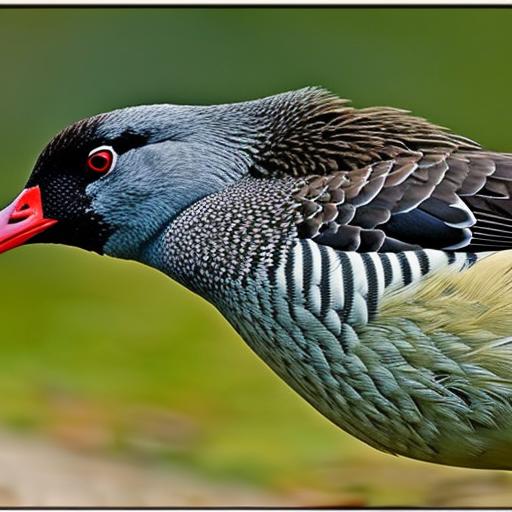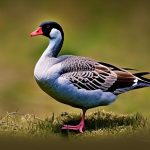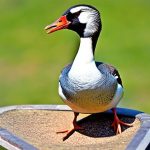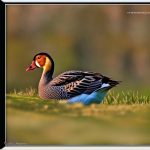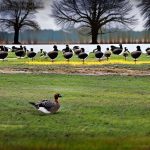Geese invading yards can be a frustrating problem for homeowners. These large birds can cause damage to lawns, gardens, and property, and their droppings can create unsightly messes. Fortunately, there are several methods that can be used to deter geese from invading your yard. In this post, we will discuss different strategies for keeping geese away, including creating physical barriers, using decoys, planting vegetation that geese dislike, using sound and light to scare them away, installing sprinkler systems, removing food sources, educating neighbors about not feeding geese, seeking professional assistance, and maintaining a clean and tidy yard.
Key Takeaways
- Geese are social animals and tend to stay in groups, making it difficult to scare them away.
- Physical barriers such as fences and netting can be effective in keeping geese out of your yard.
- Decoys such as fake predators or other animals can deter geese from entering your property.
- Planting vegetation that geese dislike, such as prickly bushes, can discourage them from nesting in your yard.
- Sound and light devices, as well as sprinkler systems, can be used to scare geese away from your property.
Understanding the behavior of geese
To effectively deter geese from your yard, it is important to understand their behavior. Geese are attracted to certain areas because they provide food sources and suitable nesting sites. They are particularly drawn to areas with open water, such as ponds or lakes, where they can find aquatic plants and insects to eat. Geese also prefer areas with short grass, as it allows them to easily spot predators. Additionally, geese are territorial birds and will defend their nesting sites aggressively.
Creating physical barriers to keep geese out
One effective method for keeping geese out of your yard is to create physical barriers that prevent them from accessing the area. There are several types of barriers that can be used, including fences, netting, and hedges. Fences should be at least three feet high and have small openings to prevent geese from squeezing through. Netting can be installed over ponds or other water features to prevent geese from landing in the area. Hedges can also be used as a barrier by creating an obstacle that geese cannot easily pass through.
When installing physical barriers, it is important to ensure they are properly maintained. Regularly inspect fences for any damage or gaps that may allow geese to enter. Repair any holes or weak spots immediately. Netting should be checked regularly to ensure it is secure and not sagging. Hedges should be trimmed regularly to maintain their effectiveness as a barrier.
Using decoys to deter geese from your yard
Another method for deterring geese from your yard is to use decoys. Decoys are objects that resemble geese and are placed in the area to scare away real geese. The presence of decoys can make geese believe that the area is already occupied and discourage them from landing or nesting there.
When using decoys, it is important to place them strategically. Decoys should be positioned in areas where geese are likely to land or nest, such as near water sources or open grassy areas. It is also important to move the decoys regularly to prevent geese from becoming accustomed to their presence.
Planting vegetation that geese dislike
Geese have certain preferences when it comes to vegetation, and there are certain plants that they tend to avoid. Planting these types of vegetation in your yard can help deter geese from invading the area. Some plants that geese dislike include tall grasses, prickly shrubs, and plants with strong odors.
When planting vegetation to deter geese, it is important to choose plants that are suitable for your climate and soil conditions. These plants should also be low-maintenance and able to withstand the presence of geese. Regularly maintain the vegetation by trimming and pruning as needed.
Using sound and light to scare geese away

Sound and light can be effective deterrents for geese. Loud noises, such as clapping or using noise-making devices, can startle geese and make them uncomfortable in the area. Similarly, flashing lights or reflective surfaces can create a sense of danger and discourage geese from landing or nesting.
When using sound and light to deter geese, it is important to vary the methods to prevent geese from becoming accustomed to them. Change the location of noise-making devices or move reflective surfaces regularly to maintain their effectiveness.
Installing sprinkler systems to deter geese
Sprinkler systems can be an effective method for deterring geese from your yard. These systems are designed to activate when geese enter the area, spraying water and creating a deterrent effect. The sudden burst of water can startle geese and make them uncomfortable, encouraging them to leave the area.
When installing sprinkler systems, it is important to position them strategically. Place sprinklers near areas where geese are likely to land or nest, such as near water sources or open grassy areas. Regularly inspect and maintain the sprinkler system to ensure it is functioning properly.
Removing food sources that attract geese
Geese are attracted to certain types of food, and removing these food sources from your yard can help deter them from invading the area. Geese are particularly drawn to areas with short grass, as it allows them to easily spot predators and find insects to eat. They also feed on grains, seeds, and aquatic plants.
To remove food sources, regularly mow your lawn to keep the grass at a height that is less attractive to geese. Remove any fallen fruits or seeds from trees or plants in your yard. If you have a pond or water feature, consider using a pond net to prevent geese from accessing the area.
Educating neighbors about not feeding geese
Feeding geese can be harmful and can contribute to their population growth and dependence on human-provided food sources. It is important to educate neighbors about the negative effects of feeding geese and encourage them not to do so.
When educating neighbors about not feeding geese, provide them with information about the potential consequences of feeding, such as increased aggression, overpopulation, and the spread of diseases. Encourage them to enjoy geese from a distance and appreciate their natural behaviors.
Seeking professional assistance for geese removal
In some cases, it may be necessary to seek professional assistance for geese removal. Professional wildlife control experts have the knowledge and experience to effectively deter geese from your yard and can provide advice on the best methods for your specific situation.
When seeking professional assistance, it is important to find a reputable company or individual. Ask for recommendations from friends or neighbors who have dealt with similar issues. Research the company or individual online and read reviews from previous customers. Contact multiple professionals to compare prices and services before making a decision.
Maintaining a clean and tidy yard to discourage geese from nesting
A clean and tidy yard can deter geese from nesting in the area. Geese prefer areas with short grass, as it allows them to easily spot predators. By regularly mowing your lawn and removing debris, you can create an environment that is less attractive to geese.
To maintain a clean and tidy yard, regularly mow your lawn to keep the grass at a height that is less attractive to geese. Remove any fallen leaves or branches from your yard. Keep garbage cans securely closed to prevent geese from accessing food waste.
In conclusion, there are several methods that can be used to deter geese from invading your yard. These methods include creating physical barriers, using decoys, planting vegetation that geese dislike, using sound and light, installing sprinkler systems, removing food sources, educating neighbors about not feeding geese, seeking professional assistance, and maintaining a clean and tidy yard. By trying these different methods, you can effectively deter geese from your yard and enjoy a goose-free outdoor space.
If you’re looking for ways to keep geese out of your yard, you might also be interested in learning about the best kind of coop for chickens. Having a secure and suitable coop is essential for the well-being of your feathered friends. Poultry Wizard has a helpful article that discusses different types of chicken coops and provides valuable insights on what kind of coop is best for chickens. Check it out here to ensure your chickens have a safe and comfortable home while you tackle the geese situation.
FAQs
What are some common reasons why geese enter yards?
Geese may enter yards in search of food, water, or nesting sites. They may also be attracted to the grass and vegetation in the yard.
What are some effective ways to keep geese out of your yard?
Some effective ways to keep geese out of your yard include installing physical barriers such as fences or netting, using decoys or scare tactics, and removing any sources of food or water that may be attracting them.
Are there any humane methods for keeping geese out of your yard?
Yes, there are several humane methods for keeping geese out of your yard. These include using noise-making devices, such as air horns or whistles, and using motion-activated sprinklers or lights.
What should I do if I encounter a nesting goose in my yard?
If you encounter a nesting goose in your yard, it is important to give it space and avoid disturbing the nest. It is also important to keep pets and children away from the area to avoid any potential conflicts.
Are there any legal restrictions on how to keep geese out of your yard?
There may be local or state regulations regarding the use of certain methods for keeping geese out of your yard. It is important to check with your local authorities before implementing any methods to ensure that they are legal and in compliance with local regulations.
Meet Walter, the feathered-friend fanatic of Florida! Nestled in the sunshine state, Walter struts through life with his feathered companions, clucking his way to happiness. With a coop that’s fancier than a five-star hotel, he’s the Don Juan of the chicken world. When he’s not teaching his hens to do the cha-cha, you’ll find him in a heated debate with his prized rooster, Sir Clucks-a-Lot. Walter’s poultry passion is no yolk; he’s the sunny-side-up guy you never knew you needed in your flock of friends!

